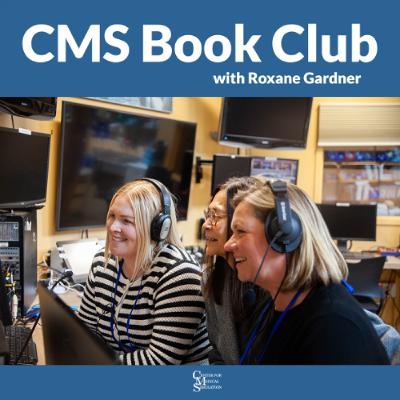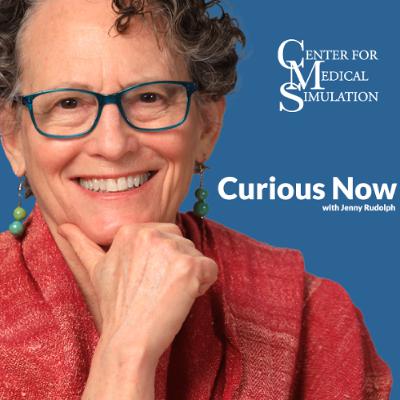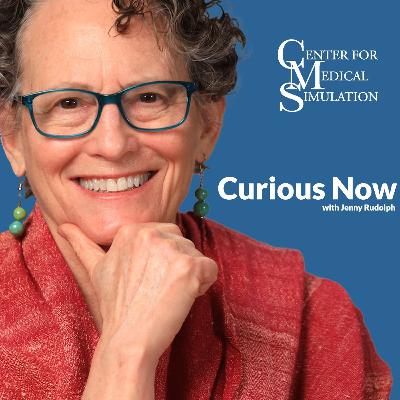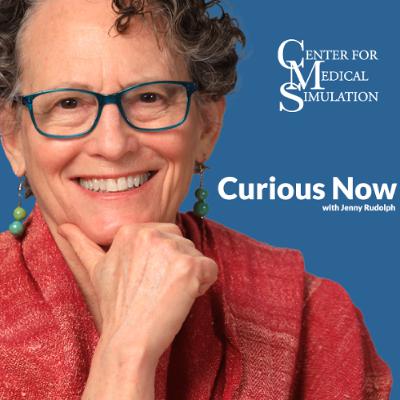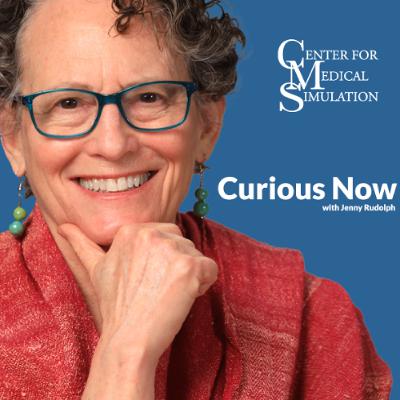Discover The Center for Medical Simulation
The Center for Medical Simulation

The Center for Medical Simulation
Author: Center for Medical Simulation
Subscribed: 91Played: 2,012Subscribe
Share
© All rights reserved
Description
A nurse preceptor has just watched a trainee commit a serious error despite hours of lecture, reading, and hands on training. In spite of herself, she starts to heat up, much like the more severe clinical educators who trained her years ago. “Why can’t you just get this right?”
An ICU attending asks her resident to call her if a patient’s hematocrit drops under a certain value. Despite this agreement, and despite the patient deteriorating, the resident never calls. “Are you an idiot? Why didn’t you call me?”
In these moments, how do we reset ourself to a place of care, curiosity, and compassion? How do we model a better culture of learning? How do we have our judgment, instead of our judgment having us?
In “Curious Now with Jenny Rudolph,” a social scientist takes on the hidden structures that shape our behavior, culture, communication, and learning in healthcare.
In this interactive podcast, Jenny Rudolph, PhD, FSSH, will help listeners approach the thoughts, feelings, and judgments underlying their reactions in a psychologically safer manner, helping us to better connect with curiosity and compassion to the people around us, especially when we feel that they’ve done something “wrong.” This podcast will include weekly challenges to examine your own thinking, including follow-up with listeners and experts about their experience on the journey to Good Judgment.
Jenny Rudolph has made a career exploring what makes clinicians, healthcare organizations, and health professions training programs tick. Underneath the surface of intelligent, capable people who care about doing their best are hidden patterns that interfere with how they perform. Hierarchy, ego, communication glitches, resilience, power, professional learning, and how learning happens all flow downstream into creating actions that work and actions that don’t.
Jenny found out the hard way that being too certain can get you in trouble. Demoted from third to second grade for poor academic performance when she arrived in Jaipur, India as an eight-year-old, she realized she had better get curious about how her new school and culture ran, and that curiosity has remained with her ever since.
Jenny now works with clinicians around the world to help them develop their own love of that little dopamine drip of rewarding surprise when you find out something new about your colleagues and how they think. Whether trying to figure out a diagnosis, discovering what a learner is thinking, or upping your own clinical mastery, getting Curious Now is the solution.
Curious Now on Spotify: https://open.spotify.com/show/72gzzWGegiXd9i2G6UJ0kP?si=890ed4b02bfe4838
Curious Now on Apple Podcasts: https://podcasts.apple.com/us/podcast/the-center-for-medical-simulation/id1279266822
--------------------
Founded in 1993, the Center for Medical Simulation was one of the world's first healthcare simulation centers and continues to be a global leader in the field. Simulation training at CMS gives healthcare providers a new and enlightening perspective on how to handle real medical situations. Through high-fidelity scenarios that simulate genuine crisis management situations, the CMS experience can open new chapters in the level of healthcare quality that participants provide. Find out more and apply for CMS simulation workshops at www.harvardmedsim.org.
An ICU attending asks her resident to call her if a patient’s hematocrit drops under a certain value. Despite this agreement, and despite the patient deteriorating, the resident never calls. “Are you an idiot? Why didn’t you call me?”
In these moments, how do we reset ourself to a place of care, curiosity, and compassion? How do we model a better culture of learning? How do we have our judgment, instead of our judgment having us?
In “Curious Now with Jenny Rudolph,” a social scientist takes on the hidden structures that shape our behavior, culture, communication, and learning in healthcare.
In this interactive podcast, Jenny Rudolph, PhD, FSSH, will help listeners approach the thoughts, feelings, and judgments underlying their reactions in a psychologically safer manner, helping us to better connect with curiosity and compassion to the people around us, especially when we feel that they’ve done something “wrong.” This podcast will include weekly challenges to examine your own thinking, including follow-up with listeners and experts about their experience on the journey to Good Judgment.
Jenny Rudolph has made a career exploring what makes clinicians, healthcare organizations, and health professions training programs tick. Underneath the surface of intelligent, capable people who care about doing their best are hidden patterns that interfere with how they perform. Hierarchy, ego, communication glitches, resilience, power, professional learning, and how learning happens all flow downstream into creating actions that work and actions that don’t.
Jenny found out the hard way that being too certain can get you in trouble. Demoted from third to second grade for poor academic performance when she arrived in Jaipur, India as an eight-year-old, she realized she had better get curious about how her new school and culture ran, and that curiosity has remained with her ever since.
Jenny now works with clinicians around the world to help them develop their own love of that little dopamine drip of rewarding surprise when you find out something new about your colleagues and how they think. Whether trying to figure out a diagnosis, discovering what a learner is thinking, or upping your own clinical mastery, getting Curious Now is the solution.
Curious Now on Spotify: https://open.spotify.com/show/72gzzWGegiXd9i2G6UJ0kP?si=890ed4b02bfe4838
Curious Now on Apple Podcasts: https://podcasts.apple.com/us/podcast/the-center-for-medical-simulation/id1279266822
--------------------
Founded in 1993, the Center for Medical Simulation was one of the world's first healthcare simulation centers and continues to be a global leader in the field. Simulation training at CMS gives healthcare providers a new and enlightening perspective on how to handle real medical situations. Through high-fidelity scenarios that simulate genuine crisis management situations, the CMS experience can open new chapters in the level of healthcare quality that participants provide. Find out more and apply for CMS simulation workshops at www.harvardmedsim.org.
221 Episodes
Reverse
Just in time for the Thanksgiving Holiday— the CMS Book Club reviews “How to Avoid Awkward Silences” by Patrick King!
“You set the tone for how people react to this… when you act awkward and diffident, people feel awkward and diffident.”
Join us as eight learning conversation experts debate the value of silence, and how we can get the conversation back to flowing when we feel like we’ve lost touch with what’s happening in the debriefing room, classroom, or around the family dinner table.
Apple Podcasts: https://podcasts.apple.com/us/podcast/the-center-for-medical-simulation/id1279266822
Why is it so hard for healthcare educators to share what they actually think in a debriefing or feedback situation? Jenny shares the story of a participant in an anesthesia clinical simulation who helped guide her to be more transparent: “I’m often talking to providers on the worst day of their career, after a medical error has occurred. If I’m going to ask them to be honest with me about what they were thinking, the least I can do is be honest about what I’m thinking.”
Over the years training faculty in feedback conversations, we’ve run into many who ask, how is it helpful to tell my learner that I think they’re an idiot? But telling the person what you think honestly should not be your feelings or attributions about their character. It should be the impact of their actions, which exist at the level of concrete data.
Workout of the Week: Practice saying to people, “When you did x, it led to y.” One great feature about this workout is that you can use it for positive things! “When you stayed late to help me with that report, it lowered my stress level.”
Spotify: https://open.spotify.com/show/72gzzWGegiXd9i2G6UJ0kP
Apple Podcasts: https://podcasts.apple.com/us/podcast/the-center-for-medical-simulation/id1279266822
Leadership Coaching from Jenny Rudolph: https://harvardmedsim.org/personal-leadership-coaching-with-jenny-rudolph/
When we lead a conversation where we only bring our conclusions and inferences to the table, rather than the concrete data that helped lead us there, we are influencing (sometimes unjustly) what is even discussable among our teams. By going back down to discussing the data that helped us shape those conclusions, we can make conversations and meetings more fair, more equal, and more productive.
Workout of the week: Note when you have gone up the ladder of inference to a conclusion about a person and perhaps lost track of the data that led you there. Then, go back down and incorporate the data into an observation. Example: “She was defensive” is an inference or conclusion. Go back down the ladder to the data and turn it into an observation: “I observed that she crossed her arms and said, ‘I don’t know,’ twice.”
Spotify: https://open.spotify.com/show/72gzzWGegiXd9i2G6UJ0kP
Apple Podcasts: https://podcasts.apple.com/us/podcast/the-center-for-medical-simulation/id1279266822
Leadership Coaching from Jenny Rudolph: https://harvardmedsim.org/personal-leadership-coaching-with-jenny-rudolph/
Too often, meetings and announcements, especially around policy changes and new ways of working, are a list of topics that fail to address the fundamental questions that matters to team members—why are we talking about this? Whose decision was it? And is that decision final?
Leaders and team members need to understand how power is being wielded, especially when it comes down the line in seemingly inhumane ways. By simply saying a few key words, we can make our teams feel like they had a voice, like power is not being used unfairly, and safe to say when they don’t understand and when they want input.
Workout of the week: Use the subject line of your emails to practice more clearly telling what the purpose of the conversation is.
Spotify: https://open.spotify.com/show/72gzzWGegiXd9i2G6UJ0kP
Apple Podcasts: https://podcasts.apple.com/us/podcast/the-center-for-medical-simulation/id1279266822
Leadership Coaching from Jenny Rudolph: https://harvardmedsim.org/personal-leadership-coaching-with-jenny-rudolph/
This week, Jenny and James explore recent conversations that didn’t go as well as they could have, because of different types of failures in the words we chose to use or the things we chose to reveal. Building on the work of recent guest Amy Edmondson, we look at the way that people in fearless organizations can talk—using the conversations that you have to frame the work, emphasize shared purpose to create joy even in everyday work, and demonstrate that you don’t think you have all the answers.
Workout of the week: Observe for conversations where you feel unclear—what was the point of this meeting, why are we having this conversation, what are our goals of care for this patient?
Spotify: https://open.spotify.com/show/72gzzWGegiXd9i2G6UJ0kP
Apple Podcasts: https://podcasts.apple.com/us/podcast/the-center-for-medical-simulation/id1279266822
Leadership Coaching from Jenny Rudolph: https://harvardmedsim.org/personal-leadership-coaching-with-jenny-rudolph/
Christian Balmer, an anesthesiologist and critical care doctor from Switzerland, joins us to look at the readiness of surgical teams in his organization to recognize and deal with cases that have gone beyond the capacity of the peripheral center to handle.
Far from being a readiness plan around technical skills, the team discovers that it is the gray areas between intersecting teams and intersection institutions where the process of caring for the patient breaks down. Do the ICU teams at both hospitals agree about when is the right time to transfer the patient? Do the surgeons have training on stepping back and declaring that there is a crisis that needs to be managed via transport? Are there communication plans in place to make sure that the ICU has available beds, and to help the main hospital trust that when the peripheral group sends a patient, that patient has a real need for the ICU bed?
Finally, we discuss aligning training programs from healthcare schools all the way to the hospital—if health systems are looking for teams that can talk to one another, work with patients, and provide care in a particular way, how can we make sure that the schools that are training future healthcare workers are in communication and prioritizing the skills and ability to learn that they will need to be ready for the job?
--------------
Host & Co-Producer: Chris Roussin, PhD, Senior Director, CMS-ALPS (https://harvardmedsim.org/chris-roussin/)
Producer: James Lipshaw, MFA, EdM, Assistant Director, Media (https://harvardmedsim.org/james-lipshaw/)
Consulting and readiness with CMS-ALPS: https://harvardmedsim.org/alps-applied-learning-for-performance-and-safety
Readiness Planning in Advances in Simulation: https://advancesinsimulation.biomedcentral.com/articles/10.1186/s41077-024-00317-z
Dare to Be Ready on Spotify: https://open.spotify.com/show/72gzzWGegiXd9i2G6UJ0kP
Dare to Be Ready on Apple Podcasts: https://podcasts.apple.com/us/podcast/the-center-for-medical-simulation/id1279266822
In this special episode, Jenny Rudolph and James Lipshaw, producer of Curious Now, debrief our performance so far with the podcast, what we had in our original vision that we haven’t achieved yet, and where we’d like to go next. How can we rachet up the interactivity of the podcast, how do we make the experience of trying to do this work right more relatable and less of a lecture, and how do we tune the difficulty of the workouts to the experience levels of our guests better?
Do you have feedback for Jenny on the first three chapters of Curious Now? Now is a great time to comment—let us know below this post what you’d like to see in the future, and how the workouts are going for you!
Spotify: https://open.spotify.com/show/72gzzWGegiXd9i2G6UJ0kP
Apple Podcasts: https://podcasts.apple.com/us/podcast/the-center-for-medical-simulation/id1279266822
Curious Now on Video: https://youtube.com/medicalsimulation
Leadership Coaching from Jenny Rudolph: https://harvardmedsim.org/personal-leadership-coaching-with-jenny-rudolph/
We have an incredibly special guest this week on Curious Now! Amy Edmondson, Professor at Harvard Business School, and author of numerous books including Right Kind of Wrong: The Science of Failing Well, Teaming: How Organizations Learn, Innovate, and Compete in the Knowledge Economy and The Fearless Organization: Creating Psychological Safety in the Workplace for Learning, Innovation, and Growth joins us to discuss her concept of psychological safety, how a failed study led to its invention, and how leaders can create organizations that learn.
An initial study with a well-validated tool found a correlation between having better teams and having HIGHER error rates. Reluctant to bring this result to her thesis advisor, she came to an idea: Maybe better teams don’t make more mistakes, but rather better teams are more willing to talk about mistakes.
Bringing psychological safety to the present day, Amy and Jenny discuss how the best examples of crisis leadership involve what Amy calls “situational humility,” the ability to say, “we’ve never been here before,” and then framing the problem as an opportunity to find solutions and seeking and inviting input, along with a continual refreshment of common purpose.
How can individuals create a “learning frame” to grow in a crisis rather than an “execution frame” where you’re just getting work done; being open to hearing feedback both from your colleagues and your work itself as you do it.
While “learning work” can seem in the short term to take more energy or more bandwidth, in the broader view it creates vastly easier work through an increase in skill and understanding. Dr. Edmondson says, “If you’re not an organization that has found ways to hardwire learning and feedback loops into everything that it does, you will get caught unawares in a fast-changing, complex world.”
Spotify: https://open.spotify.com/show/72gzzWGegiXd9i2G6UJ0kP
Apple Podcasts: https://podcasts.apple.com/us/podcast/the-center-for-medical-simulation/id1279266822
Leadership Coaching from Jenny Rudolph: https://harvardmedsim.org/personal-leadership-coaching-with-jenny-rudolph/
This week Laura Rock and Janice Palaganas return to crack the code of team culture, map the blueprint underneath what we’re thinking. In the final episode of this chapter, we ask our guests what they’ve discovered about themselves with a Frames, Actions, Results test.
Janice has a glitch with a student where their understandings didn’t match, and Laura shares how being honest about her own critical care strengths and weaknesses with a group of trainees helped them focus on learning the most from her and other members of the team.
Spotify: https://open.spotify.com/show/72gzzWGegiXd9i2G6UJ0kP
Apple Podcasts: https://podcasts.apple.com/us/podcast/the-center-for-medical-simulation/id1279266822
Leadership Coaching from Jenny Rudolph: https://harvardmedsim.org/personal-leadership-coaching-with-jenny-rudolph/
This week on Curious Now we’re introducing a tool to help us bring the approach of understanding why people did what they did and helping them change the underlying analysis that got them into trouble, called the FAR or Frames, Actions, Results tool.
Where has your team gotten stuck or glitchy, and what were the underlying frames that got your team intro trouble or got the job done great?
Spotify: https://open.spotify.com/show/72gzzWGegiXd9i2G6UJ0kP
Apple Podcasts: https://podcasts.apple.com/us/podcast/the-center-for-medical-simulation/id1279266822
Leadership Coaching from Jenny Rudolph: https://harvardmedsim.org/personal-leadership-coaching-with-jenny-rudolph/
More on the LPG: https://www.aliem.com/improving-debriefing-skills-pathways-grid/
Dare to Be Ready with Dr. Chris Roussin, founder of CMS-ALPS, the Center for Medical Simulation’s team and organization readiness consulting service. In this podcast, available on Spotify, Apple Podcasts, and in video form on Youtube, Chris will meet with a series of guests with specific readiness challenges in their healthcare teams. Each week we will approach the challenge of how to get teams ready for the difficult work they face every day, and work through how we can get our people and teams ready to face that challenge. Join us monthly and Dare to Be Ready!
-----------
Episode 1: Ready to Help “Safe” Patients with Diabetes in the ER
Dr. Marie McDonnell is an Endocrinologist and Director of Diabetes at the Brigham and Women’s Hospital, joins us to discuss her team’s readiness challenges around training with the Emergency Room to connect triaged emergency care with diabetes specialty care.
Readiness Challenges: The care teams in the Emergency Room are ready and skilled in treating patients with diabetes who come in very sick and need to be admitted to the hospital. However, the Emergency Room also experiences a very high volume of diabetes recidivism, patients with diabetes who are stabilized and able to be discharged but then return later with the same issue presenting again. This is compounded by the fact that 50% of diabetes patients in the ER arrive between 5 PM and 9 AM because they could not contact their normal endocrinology care teams.
Today we work on a readiness plan to help ER teams better connect into the big system of diabetes care within the hospital so that patients who are “safe” get connected with specialists who can solve the underlying diabetes self-care issues that brought them to the ER, so that they don’t end up back in the ER later that day.
--------------
Host & Co-Producer: Chris Roussin, PhD, Senior Director, CMS-ALPS (https://harvardmedsim.org/chris-roussin/)
Producer: James Lipshaw, MFA, EdM, Assistant Director, Media (https://harvardmedsim.org/james-lipshaw/)
Consulting and readiness with CMS-ALPS: https://harvardmedsim.org/alps-applied-learning-for-performance-and-safety
Dare to Be Ready on Spotify: https://open.spotify.com/show/72gzzWGegiXd9i2G6UJ0kP
Dare to Be Ready on Apple Podcasts: https://podcasts.apple.com/us/podcast/the-center-for-medical-simulation/id1279266822
Laura Rock, Janice Palaganas and Jenny explore where they are currently struggling in their practice of sharing their point of view clearly and then really inviting the other person’s perspective. How does this go when your identity is more provisional, and you feel like to have to establish yourself and insert your point of view to be ‘strong’?
Spotify: https://open.spotify.com/show/72gzzWGegiXd9i2G6UJ0kP
Apple Podcasts: https://podcasts.apple.com/us/podcast/the-center-for-medical-simulation/id1279266822
Today we’re talking about transforming toxic culture, whether on your floor, in your unit, or in your department. How do we change unit culture via point of care conversations? You can teach people all the speaking skills in the world, but if they don’t care about the other people in the room or don’t think there’s a possibility they aren’t perfectly right, it won’t take. This topic was featured in a keynote of the same name by our colleague Laura Rock at SESAM2025 this summer.
Workout of the week: Share your point of view, and follow it with a genuine, open inquiry into the other person’s perspective.
Spotify: https://open.spotify.com/show/72gzzWGegiXd9i2G6UJ0kP
Apple Podcasts: https://podcasts.apple.com/us/podcast/the-center-for-medical-simulation/id1279266822
Leadership Coaching from Jenny Rudolph: https://harvardmedsim.org/personal-leadership-coaching-with-jenny-rudolph/
Janice Palaganas and Laura Rock rejoin us to talk about their experiences of moving from mental rehearsal to actually asking the group, “What am I missing?” We explore what are the things we do or struggle with in terms of point of care conversations?
Spotify: https://open.spotify.com/show/72gzzWGegiXd9i2G6UJ0kP
Apple Podcasts: https://podcasts.apple.com/us/podcast/the-center-for-medical-simulation/id1279266822
This week on Curious Now, bring home the heart of this summer's work on internal resets, thought bystanding, communication, and teamwork. Our workout of the week is a simple one: go from mental rehearsal to actual practice.
In previous weeks we asked ourselves, and this week ask the group:
• “Who sees this differently?”
• “What am I not noticing?”
Learn more and get coaching from Jenny Rudolph at at www.harvardmedsim.org.
Coming soon on the CMS Podcast channel-- The "Dare to Be Ready" podcast with Chris Roussin! Join us and a series of rotating guests as we examine readiness challenges across a broad swath of healthcare settings, and work with experts to solve their team problems in real time.
Our first episodes include getting Boston Emergency Room teams ready to handle diabetic patients who are "safe" to be discharged but likely to end up back in the ER without additional support, getting surgical teams at a peripheral hospital in Switzerland ready to declare a crisis and prepare to transport a patient they don't have the resources to care for, and much more!
Dare to Be Ready will premiere in September, so keep your ears open! Available on Spotify, Apple Podcasts, and Youtube.
On this week’s Curious Now Listeners, Jenny, Laura Rock, and Janice Palaganas each share a recent time that they’ve struggled to be transparent with their own thinking as they rejoin us to discuss their experience with last week’s workout of sharing one vulnerable point of view in a conversation to try to work towards a collaborative inquiry rather than mystery and defensiveness.
Spotify: https://open.spotify.com/show/72gzzWGegiXd9i2G6UJ0kP
Apple Podcasts: https://podcasts.apple.com/us/podcast/the-center-for-medical-simulation/id1279266822
In decades of faculty and clinician training at the Center for Medical Simulation, we’ve identified one element of our approach to Good Judgment learning conversations that people have the most difficulty with. This obstacle can take what should be an insightful, curious inquiry and leave it with a defensive or confused learner. Similar effects happen in negotiations at point of care and feedback conversations. The greatest obstacle is this: clearly and transparently sharing what you think about the situation. There are many reasons why we struggle with this, from thinking that if we share what we believe, it will be too harsh or too threatening for the other person, to believing that sharing our point of view will be used against us and that it would be safer to try to unilaterally steer the discussion without it. In this week’s workout, you’ll be challenged to try sharing your underlying point of view in a situation where that feels vulnerable to you.
Spotify: https://open.spotify.com/show/72gzzWGegiXd9i2G6UJ0kP
Apple Podcasts: https://podcasts.apple.com/us/podcast/the-center-for-medical-simulation/id1279266822
Janice Palaganas and Laura Rock join us for our first Listeners episode of this new chapter! This week we are discussing how the mental rehearsal of asking “What am I missing?” worked out for them in situations where they were very sure that they were right.
Emerging again is a theme where our listeners find that they experience the work of checking their emotions and getting curious very different in professional settings where they are working in a certain mode versus how they conduct themselves in ‘default mode’ in their personal life.
Spotify: https://open.spotify.com/show/72gzzWGegiXd9i2G6UJ0kP
Apple Podcasts: https://podcasts.apple.com/us/podcast/the-center-for-medical-simulation/id1279266822
Join us for our third chapter of Curious Now, as we talk about words and mindsets that can transform toxic culture!
Becoming skeptical of your own thoughts and beliefs, bystanding your own perception of events so that you can ask with curiosity: “What am I missing here?” We’re setting the stage for our third chapter of Curious Now, looking at how we can skillfully lead teams and scale up our good judgment approach to not just ourselves but the people around us.
We’ve talked previously about becoming aware of our own reactive judgments and perceiving them as thoughts rather than reality. But what we mean here is a more challenging exercise: can we bystand not just what we might call ‘System 1’ thoughts, which are easy to understand as hot or instinctive reactions, but also our ‘System 2’ thoughts which are cooler, more considered and, at least to us, rational?
• Get coaching from Jenny Rudolph at www.harvardmedsim.org
• Spotify: https://open.spotify.com/show/72gzzWGegiXd9i2G6UJ0kP
• Apple Podcasts: https://podcasts.apple.com/us/podcast/the-center-for-medical-simulation/id1279266822


